Unbreakable spirit: Nadra tells cancer 'bring it on'
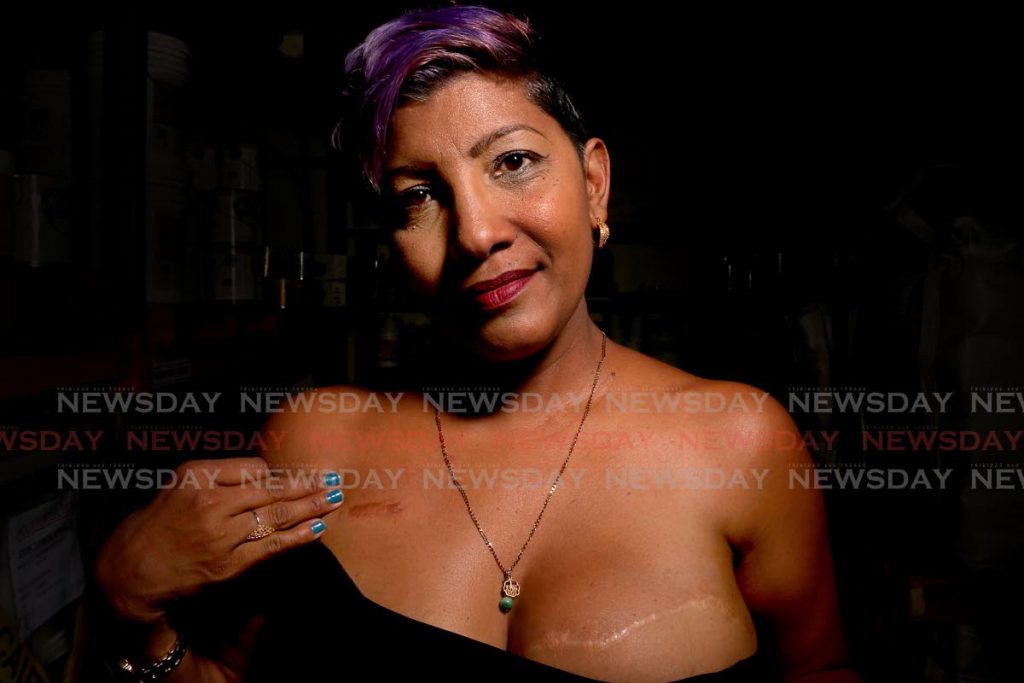
Sometimes Nadra Supersad forgets she has cancer.
These days, she and her family speak about it as one would speak of a common cold.
“So how’s your cancer?” her mother, Shanty, would ask her at their home in Carapichaima, where they both live along with her sister, Neela.
Supersad would say things are going well. She may even mention when her next session of chemotherapy would be, then say she would have to visit a client after – then go back to whatever they were talking about.
She and her sister even have an inside joke when speaking about her left breast, which had to be removed because of cancer and the reconstructed breast which was fashioned from skin and fat from her belly.
“There would be times when I would grab the breast if it is hurting or itching, and my sister would ask, ‘What happen, yuh belly hurting?’ Then the both of us would start laughing,” Supersad said.
Supersad, 45, was diagnosed with breast cancer in 2009, and beat it. In 2018, she fought it again when it appeared in her lungs, and beat it. Now she is battling malignant tumours on her spine.
A director and technical product representative at her family business, Corrosion and Environmental Services Ltd, she speaks of her illness with a confidence and light-heartedness which one would not expect from a person now in her third round of battle with the disease. Even friends and family around her are amazed at her spirit after living through a decade of physical, mental and emotional trauma which comes with living with cancer.
“People look at me and say, ‘I don’t know how you do it.’ They say, ‘If it were me I would probably be home in a corner going mad.’
"But you see, you can’t be depressed. If I worry for two days, or three days, I will still have it. So deal with the situation and enjoy every day.”
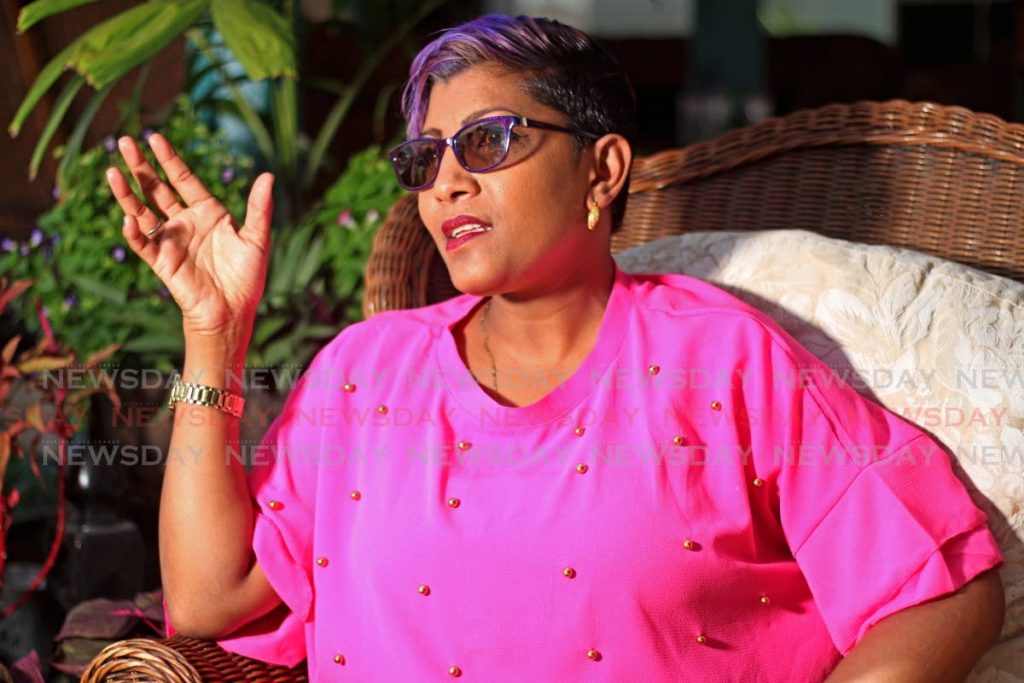
And enjoy it she does.
Aside from her treatment for the cancer that has now appeared in her spine, she also goes to the gym, travels, visits the beach, and does hiking and biking trails, among other things.
“I even got two broken ribs riding,” she said. “I fell down in a river.
"If you find me in my room, it is because I really have nothing to do. I make sure and enjoy my life so that if I close my eyes tomorrow, I know I enjoyed my life.”
Supersad said the key to beating cancer, as she has done twice before, and living with it as she does now, is to have faith, depend on family and loved ones for support and listen to doctors’ instructions and advice.
Her story started the same way millions of other women’s stories all around the world started – with a tiny lump.
It was August of 2009 and Supersad was 35. She was living a regular life with a steady job and boyfriend. In fact it was her boyfriend who suggested she go to the hospital.
“I had a fever. I had it for two days, which is normal in any case if you have a flu or something.
"After the third or fourth day of having the fever, my boyfriend got worried and told me it was time to go to the doctor.”
She had a full check-up, and when results came back the doctor told her he had felt a tiny node in her left breast.
“It was one millimetre or one centimetre in size. I don’t really remember which. I couldn’t even feel it myself.”
At the time she did not worry that the growth might be cancerous. Although she knew as much as the average person about the disease, she heard sometimes lumps could be benign. She thought it might have been a collection of fatty tissue. Having cancer was the last thing on her mind.
Her doctor told her to self-examine and monitor the lump.
In 2010 she went back to the doctor and had an ultrasound to see if anything had changed.
The doctor told her when he felt the lump he felt something different: the tiny lump had grown.
“It was now five millimetres.That was when I started to worry. That was when I said to myself something was wrong.”
But still she denied it could be cancer. She did not have a family history of cancer, she was young and fit, she did not have a poor diet: she was good. But when she went to doctors and they examined her they continued using words like “suspicious” to describe the tiny but growing lump in her breast.
“I went to a specialist and he said. 'We need to remove this.' He said it was a mass of something, but he didn’t want to say it was cancer. He suggested that I (do) a biopsy. I said, 'Hear what, I don’t want to do any biopsy. Just take it out.'”
They did a lumpectomy, which differs from a mastectomy in that only the part of the breast including the lump would be removed. The doctor sent the lump for testing, which took three weeks.
“All kinds of thoughts were running through my head for those three weeks, but I was positive. Everyone was concerned, but I told them not to worry until we got results.”
She went to the doctor by herself: her boyfriend was unable to go with her and she didn’t want to bother her parents.
The doctor sat her down and told her the results were not good news.
“He told me, ‘You have stage three breast cancer.’
"I cried and cried. I was in shock.
"I started to wonder what caused it. Was it something that triggered my cancer cells? Was it stress from my job?
"The doctor told me he would give me three months to come to terms with everything, but I would have to remove my breast if I wanted to live. I said, 'Whatever it takes, do it.'”
In December that year she went to St Clair Medical Centre and had a full mastectomy. The surgery took between four and six hours. Doctors found three tumours in her breast and had to dig deeper, into her ribcage, to remove one of them.
When she woke up the next morning, the first thing she saw was the bandage across her chest. She said she sat on the bed and wept as waves of emotion swept over her. She cried out of relief that the cancer in her body had finally been removed. She cried out of loss because a part of her body was removed as well.
Supersad was not the only person in her family who was under the knife in hospital. Her father, who was diabetic was at Westshore Medical Centre for stent surgery.
“It was a real struggle for the rest of my family to bounce between Westshore and St Clair. It was tough for them to deal with both me and my dad. I thought about him a lot. I didn’t get to see him while he was about to go to surgery because I was about to undergo mine, but his surgery was successful as well as mine.”
After a couple weeks’ rest she returned to the hospital to have her stitches removed. She had become flat-chested. And she wasn’t out of the woods with the cancer yet either. In January 2011, she was sent to St James Medical Facility, where she would have to have chemotherapy for five months, as well as a month of radiation treatment at Good Health Facilities.
She said her faith and the support of her family and friends kept her so strong that she was able to bear the nausea, tiredness and hair loss that came with the treatment.
“Don’t get me wrong, chemotherapy does damage to your body and to you as a person. It was difficult, because of the constant upset feeling. I never puked, but I felt sick.
"I could still continue to work, but not many workplaces would accommodate you.”
She said when someone has chemotherapy, the side effects do not kick in until the next day. On the day of the treatment, she would have to sit for hours while the medication was intravenously fed into her. The after-effects leave people sick for days. In January 2011, Supersad would have to stay away from work for three to four days after she was given the medication. But the sickness was not the worst effect of the treatment.
“Even though I was sick, I was still active. But I lost my hair.”
She recalled crying in the shower as she pulled out clumps of her hair, which she had worn at chest length. This, as well as living with a scar where her left breast should be, put her in a deep depression. It was at this time she depended heavily on the support of her friends and family.
“My boyfriend put me to sit down one day after he saw my hair dropping out. He told me not to move. Then he brought a shaver and a bowl of water. Then he shaved my head.
"When he was done, he shaved his.
"That was a really emotional moment for me. Losing my hair affected me more than the chemotherapy.”
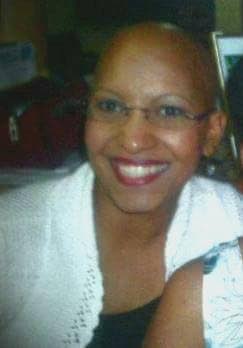
She said the treatment also instilled fear in her, especially after seeing friends die whom she had met while undergoing treatment. Sometimes she would get the news from family members or friends. Over her five months of treatment, she lost three friends to the disease.
After she was cleared, Supersad spent the following five years taking tamoxifen, a pill she took every day to help keep the cancer cells from re-emerging in the breast. She would also have to have an injection once a month – Zoladex – to suppress the oestrogen in her body.
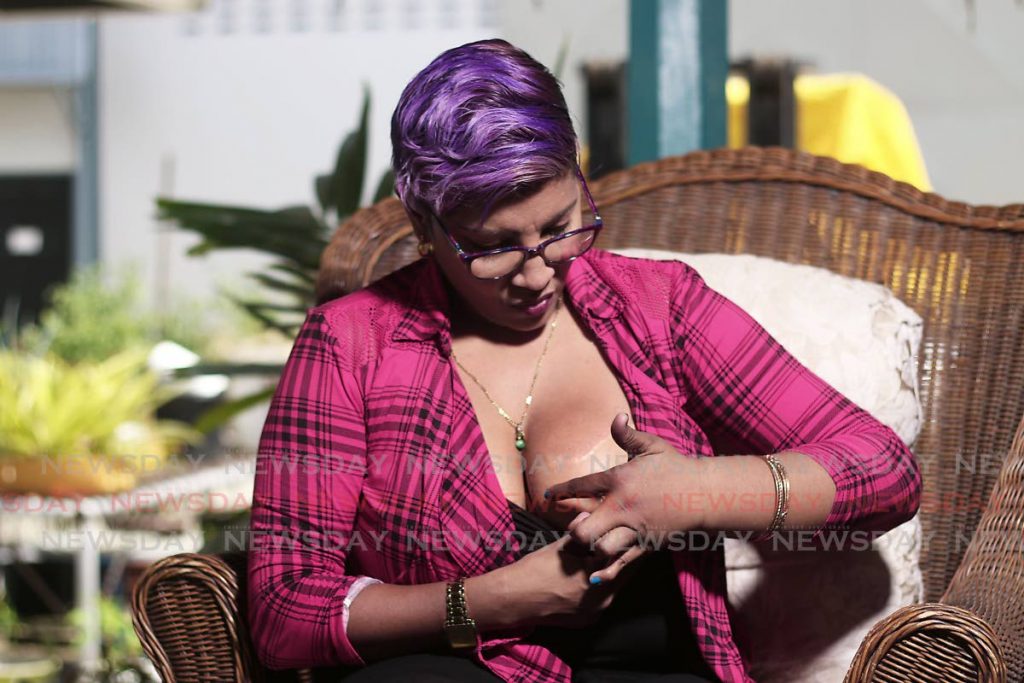
Supersad got her breast back in 2013, two years after her mastectomy, in an 11-hour operation. Doctors did what was called a flap, cutting across her waist and pulling out belly fat to fashion into a breast. She said it was a great confidence boost finally to be able to wear clothes that she liked. She even looked on the bright side of the surgery, saying she got more than she bargained for: “I got a new breast and a tummy tuck. Well, I can’t call it a tummy tuck now,” she quipped.
Her fight with cancer did not stop with this ordeal. In 2016, she began to have breathing problems. For months she used asthma medication to treat it, but it persisted. Once again a friend told her to go to a doctor. Immediately she recalled the ordeal she had just gone through with her breast.
“You are susceptible to anything that comes on when you have cancer, so we went to check at Mt Hope hospital. They did a CT scan and saw something strange on my lungs. Late in the night, they spoke with me and said the right lower lobe of my lung collapsed. They wanted to do a bronchoscopy.
"After, they showed me that there was something like a ball that was blocking the passage to that part of my lungs. They said it was a tumour,” she said. “When they told me that, I cussed.”
A whole-body CT scan revealed another cancerous mass in her left lung, behind the left atrium of her heart.
She was sent back to St James Infirmary. She had to do everything again. This time, her body did not react in the same way. Veins went dead because of repeated injections. Blood pressure tests could not be done on one arm or blood taken from it because lymph nodes had been removed from it. She went back under the treatment for 12 sessions and needed chemotherapy every two weeks.
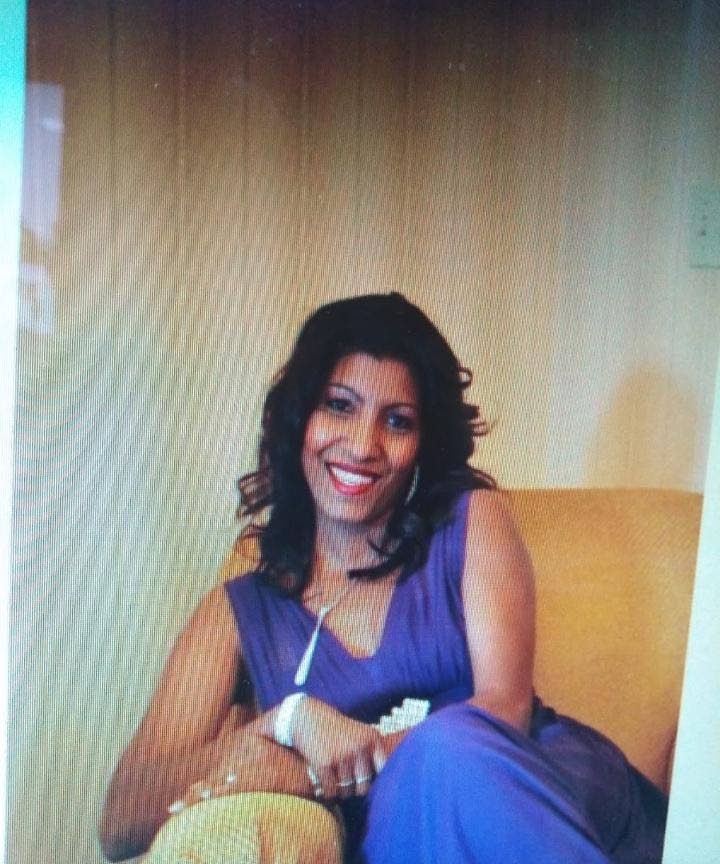
After the end of her second bout of chemotherapy last year, she went to Miami for a PET scan, which scans the entire body for cancer. She was about to have her last chemotherapy session, and doctors had said her lungs were cancer-free.
But the cancer had come back in her spine.
Thankfully the treatment for the cancer in her lungs had also knocked out the majority of cancer cells on her spine. She now has to undergo bone therapy to eliminate the rest.
“For the next year or two I will have to do this bone therapy,” she said.
Supersad said battling cancer, after all these years, was not a walk in the park. She often wonders what the disease will throw at her next, but said she was prepared for anything, with the love and support of her family and the strength of her own unbreakable spirit.
“I can hold my head high and know this was not a death sentence for me.
"I think about where it would come next. It went in my breast, it went in my lungs, it went in my spine – and I dealt with it.
"I have been through hours of surgery. I lost my breast. My lung collapsed.
"What more could you bring to me to bring me down? Whatever it is, they can bring it on.”


Comments
"Unbreakable spirit: Nadra tells cancer ‘bring it on’"